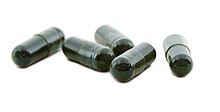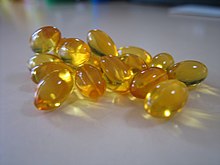**Types of Dietary Supplements**:
– **Vitamins**:
– Essential organic compounds required in limited amounts by humans.
– Deficiency can lead to associated symptoms.
– U.S. Institute of Medicine sets tolerable upper intake levels.
– **Minerals**:
– Chemical elements necessary for life.
– Essential minerals like carbon, hydrogen, oxygen, and nitrogen are common.
– **Proteins and Amino Acids**:
– Marketed for various health benefits.
– Include whey protein, casein, soy, pea, hemp, or rice protein.
– **Bodybuilding Supplements**:
– Used to increase lean body mass and athletic performance.
– Common ingredients include high protein drinks, BCAA, glutamine, creatine, and whey protein.
– **Essential Fatty Acids**:
– Omega-3 and omega-6 fatty acids are crucial for human health.
– Play a significant role in brain function, growth, and inflammation.
**Minerals and Nutrients**:
– **Essential Minerals**:
– Include potassium, calcium, iron, zinc, selenium, and others.
– Some minerals may not be essential for humans.
– **Health Benefits**:
– Adequate intake can reduce the risk of diseases like osteoporosis.
– FDA allows specific health claims for certain dietary supplements.
**Regulations and Compliance**:
– **Regulatory Framework**:
– DSHEA defines dietary supplements and categorizes them as food.
– Regulations differ for meal replacement products and medical foods.
– **Health Claims**:
– FDA allows specific health claims for calcium, selenium, and chromium picolinate.
– Qualified Health Claims (QHCs) are backed by scientific evidence.
**Industry and Market Trends**:
– **Market Statistics**:
– American dietary supplement market was valued at $140.3 billion in 2020.
– Global market projected to reach $196.6 billion by 2028.
– **Growth Factors**:
– Technological advancements and increased demand for healthy products drive market growth.
**Fraudulent Practices and Health Risks**:
– **Deceptive Practices**:
– Reports of unsafe levels of heavy metals in protein powders.
– Studies revealing low-quality herbal supplements with inaccurate ingredients.
– **Fraudulent Ingredients**:
– Retailers selling supplements with dangerous and fraudulent ingredients.
– Adulterated supplements containing substances leading to health risks.
The examples and perspective in this article may not represent a worldwide view of the subject. (April 2020) |
A dietary supplement is a manufactured product intended to supplement a person's diet by taking a pill, capsule, tablet, powder, or liquid. A supplement can provide nutrients either extracted from food sources, or that are synthetic (in order to increase the quantity of their consumption). The classes of nutrient compounds in supplements include vitamins, minerals, fiber, fatty acids, and amino acids. Dietary supplements can also contain substances that have not been confirmed as being essential to life, and so are not nutrients per se, but are marketed as having a beneficial biological effect, such as plant pigments or polyphenols. Animals can also be a source of supplement ingredients, such as collagen from chickens or fish for example. These are also sold individually and in combination, and may be combined with nutrient ingredients. The European Commission has also established harmonized rules to help insure that food supplements are safe and appropriately labeled.





Creating an industry estimated to have a value of $151.9 billion in 2021, there are more than 50,000 dietary supplement products marketed in the United States, where about 50% of the American adult population consumes dietary supplements. Multivitamins are the most commonly used product among types of dietary supplements. The United States National Institutes of Health states that supplements "may be of value" for those who are nutrient deficient from their diet and receive approval from their medical provider.
In the United States, it is against federal regulations for supplement manufacturers to claim that these products prevent or treat any disease. Companies are allowed to use what is referred to as "Structure/Function" wording if there is substantiation of scientific evidence for a supplement providing a potential health effect. An example would be "_____ helps maintain healthy joints", but the label must bear a disclaimer that the Food and Drug Administration (FDA) "has not evaluated the claim" and that the dietary supplement product is not intended to "diagnose, treat, cure or prevent any disease", because only a drug can legally make such a claim. The FDA enforces these regulations and also prohibits the sale of supplements and supplement ingredients that are dangerous, or supplements not made according to standardized good manufacturing practices (GMPs).
